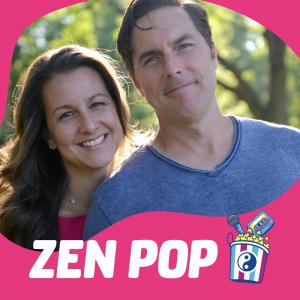Zen Pop

Not Tuning Out—Just Engaging Differently Episode #806
Todd and Cathy shared strategies for staying informed without burning out from the world, and the need for personal well-being for continued engagement and making a difference.
Some Ways to Support Us
Order Restoring our Girls Join Team Zen Sign up for Cathy’s SubstackLinks shared in this episode:
For the full show notes, visit zenparentingradio.com.
This week’s sponsor(s):
- Avid Co DuPage County Area Decorating, Painting, Remodeling by Avid Co includes kitchens, basements, bathrooms, flooring, tiling, fire and flood restoration.
- David Serrano- Certified Financial Planner- 815-370-3780
- MenLiving – A virtual and in-person community of guys connecting deeply and living fully. No requirements, no creeds, no gurus, no judgements
- Todd Adams Life & Leadership Coaching for Guys
Other Ways to Support Us
- Ask Us Anything!
- Follow us on social media
- Buy and leave a review for Cathy’s Book Zen Parenting: Caring for Ourselves and Our Children in an Unpredictable World
- Find everything ZPR on our Resources Page
- Guys- Complete a MenLiving Connect profile
Bullet points-
- Set Boundaries
- Allocate specific times for news consumption (e.g., 15 minutes in the morning or after work).
- Avoid checking the news right before bed to protect your mental space.
- Diversify Media Types
- Switch between reading, podcasts, and videos to prevent fatigue.
- Choose formats that feel manageable rather than overwhelming.
- “Good Enough” Knowledge
- You don’t need to know every detail about every issue. Aim for a solid understanding rather than full mastery.
- Balance Heavy News with Positive Stories
- Seek out hopeful, solution-focused reporting to counterbalance negative headlines.
- Actionable Steps
- When news feels overwhelming, channel that energy into something productive—donating, volunteering, or having meaningful conversations.
- Self-Care
- Recognize when you need to step away and give yourself permission to unplug without guilt.
- Be Mindful of Social Media
- Social media algorithms often amplify anxiety-inducing content. Consider limiting exposure or curating your feed to minimize stress.
- Discernment
- Ask yourself: Do I need to know this? How does this information serve me? This can help you focus on what truly matters.
AI Summary
Summary
Parents’ Favoritism and Golden Child
Todd discussed a study by the American Psychological Association (APA) that analyzed data from over 19,000 participants, revealing that parents tend to favor their daughters, eldest children, and more conscientious kids. Todd and the other participants debated the reasons behind this preference, with some suggesting it might be due to the child being easier to parent or more emotionally connected. They also discussed the concept of a “golden child” and how it might be perceived as a way for parents to feel good about themselves rather than a reflection of the child’s actual qualities.
Todd Discusses Jill Scott and Philanthropy
Todd discusses a song called “Golden” by Jill Scott, an R&B singer and actress known for her roles in Tyler Perry’s movies. He then shares positive news from the Good Good Good Newsletter, highlighting Travis Kelce’s donation of a mansion for homeless youth housing and Virginia lawmakers’ unanimous passage of a bill to educate the public about menstrual disorders. Todd expresses his preference for tangible philanthropic efforts and wonders about the implementation of the Virginia education initiative.
Menopause Education and Self-Advocacy
Todd discussed the lack of education on menopause for medical professionals, highlighting the need for women to advocate for themselves and seek information on the topic. He shared his personal experiences and the challenges of finding reliable information, emphasizing the importance of self-education and seeking specialists when necessary.
Todd’s Reflection on Mary Oliver’s Poem
Todd discussed a Mary Oliver poem that resonated with him, focusing on the themes of worry, self-improvement, and health. He emphasized the importance of recognizing when worry is not productive and instead choosing to “go out and sing,” suggesting that this mindset shift can be practiced over time. Todd clarified that the poem does not advocate for complete elimination of worry, but rather encourages individuals to recognize when they are stuck in a cycle of worry and to break free from it.
Todd Discusses Trust and Communication
Todd discussed the importance of trust and open communication in relationships, particularly in the context of parenting. He emphasized that snooping or hiding information is not a healthy approach and can damage relationships. Todd also shared his perspective on the balance between staying informed and avoiding excessive worry or fear. He used examples from popular culture to illustrate his points. The conversation ended with a discussion on the potential benefits of open communication and the importance of understanding human nature in relationships.
Staying Informed Without Burning Out
Todd discusses strategies for staying informed without burning out. He emphasizes setting boundaries around media consumption, diversifying media types, and aiming for “good enough” knowledge rather than trying to understand everything in depth. Todd suggests balancing negative news with positive stories, taking actionable steps when possible, practicing self-care, and being mindful of social media’s effects. He stresses the importance of discernment in choosing what information to consume and engaging differently rather than tuning out completely. The conversation concludes with the idea that maintaining personal well-being is crucial for continued engagement and making a difference.






 Visit Podcast Website
Visit Podcast Website RSS Podcast Feed
RSS Podcast Feed Subscribe
Subscribe
 Add to MyCast
Add to MyCast